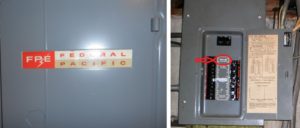Federal Pacific Electric Company (FPE) was one of the most common manufacturers of circuit breaker panels in North America from the 1950s to the 1980s. Millions of their panels were installed in homes across the country. Yet, as the years passed, electricians and home inspectors often found Federal Pacific Electric panels failed to provide proper protection to homeowners and their families. Experts now say that FPE panels can appear to work fine for years, but after one overcurrent or short circuit, they can overheat and become fire hazards.
MBH Electrical Contractors is New Jersey's leading FPE replacement company in Maplewood New Jersey for many years. MBH Electric only uses licensed electricians and our team runs into these breakers on a weekly basis. We have replaced thousands of FPE Breakers in Maplewood New Jersey in the past few years. If you know that you have an FPE on your property, it is important that you have an experienced electrician handle the repair.
When a FPE Breaker fails to trip, an extreme amount of power from the outside electrical supply surges into a home’s panel and circuits. Once that happens, it cannot be stopped or shut off manually. Electricity will burn until it runs out of fuel or the wires melt. A Federal Pacific Electric Company Circuit Breaker panel could overheat and catch fire, causing serious harm to a home and its occupants. Many Federal Pacific Electric panels and breakers can operate properly for years. But if and when they do malfunction, a disaster could occur.
In a class-action lawsuit, a New Jersey State Court ruled that the Federal Pacific Electric (FPE) Company “violated the Consumer Fraud Act because Federal Pacific Electric knowingly and purposefully distributed circuit breakers which were not tested to meet UL standards…”. An expert who investigated the potential hazards of Federal Pacific Electric panels stated under UL 489 test conditions, that FPE panels fail to trip at a much higher rate than standard panels.
Damage Caused by Federal Pacific Electric Panels
A Federal Pacific Electric (FPE) circuit breaker panel many times can appear to look normal and work properly for years and years. However, many experts have warned that if a Federal Pacific Electric panel experiences an overcurrent or short circuit, it may not keep the electrical circuits from overheating and could possibly pose a fire hazard.

The homeowner had no way of knowing that too many electrical devices were plugged into one room. The devices required more electricity than the circuit could provide. “The wiring got hot enough to fry an egg,” the electrician reported. Normally, the circuit breakers should trip to cut off the electricity and prevent a fire. The Federal Pacific Electric breakers did not operate properly, resulting in two circuit breakers and a bus bar being burned.
According to a report, some Federal Pacific Electric panels failed to operate properly nearly 60% of the time in the event of a power surge. Here is one example of a Federal Pacific Electric panel. The homeowner reportedly heard a loud pop, followed by a sizzling noise and a burning smell. She called an electrician; this is what he found.
Why Do Federal Pacific Electric Panel Malfunction in New Jersey?
The circuit breaker panel is one of the most important parts of a home’s electrical system. It constantly distributes and receives electricity. The panel protects homes from power surges and other possible hazards. With regular maintenance by a licensed electrician like MBH Electrical Contactors, experts say that today’s electrical panels can function properly and protect homes for 30 years or more.
If you suspect that you may have a Federal Pacific Electric, Zinsco, or an outdated circuit breaker panel in your home or property, or in any event, you have not had your panel inspected recently, you owe it to yourself and your family to contact a licensed electrical contractor in your area for an inspection.
Experts report that Federal Pacific Electric (FPE) circuit breaker panels in Maplewood New Jersey may have three major faults that could pose a danger:
1.) Federal Pacific Electric panels may not meet today’s updated safety codes.
Federal Pacific Electric panels in Maplewood New Jersey were produced from the mid-1950s well into the 1980s. Experts say that FPE panels produced during that time frame would not conform to today’s updated safety codes and would no longer be allowed to be sold to the general public. Safety standards that were once acceptable years ago are no longer considered safe. Some of the examples cited by experts as to why FPE panels would not pass today’s updated safety codes are:
- Wires may be crowded inside the panel box.
- Bus bars may be spring-mounted.
- Breakers may be still active when in the down position.
- Split-bus breakers may no longer meet updated safety codes.
2.) Federal Pacific Electric panels may have manufacturing defects.
Using UL 289 test conditions, the Consumer Product Safety Commission (CPSC) found that Federal Pacific Electric panels may be unfit for homes. The materials used to construct the breakers may be weak. As a result, the breakers may not trip, and the panel could be susceptible to catching on fire.
3.) Federal Pacific Electric panels may have significant design flaws.
Experts report that the identified design flaws in FPE panels are not shared with other panels of similar age. Specifically, examples of design flaws in Federal Pacific Electric panels include:
- Breakers may unexpectedly trip when the dead-front cover is removed.
- Breakers may have loose connections to the bus bars.
- Breakers are often jammed within their sockets, which can cause overcrowding within the panel.
- Breakers can easily split when placed into sockets.
3.) Federal Pacific Electric panels may have manufacturing defects.
Using UL 289 test conditions, the Consumer Product Safety Commission (CPSC) found that Federal Pacific Electric panels may be unfit for homes. The materials used to construct the breakers may be weak. As a result, the breakers may not trip, and the panel could be susceptible to catching on fire.


